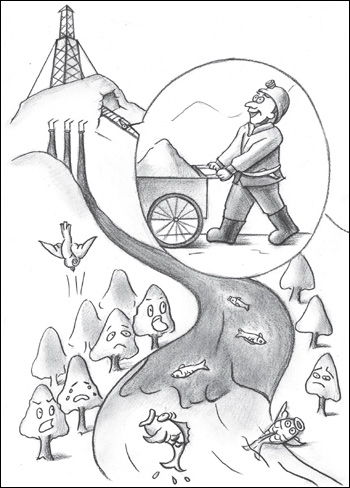Outrageous pollution poisons our children
|
Illustration by Shen Xinyi [Shanghai Daily] |
A series of heavy metal pollution scandals - involving thousands of poisoned children in several provinces - should sound the alarm: these enterprises need to clean up their act, once and for all.
The dangers of polluting the environment and the people who live near mining and smelting enterprises must be taken to heart.
Blood tests last week on over 3,000 children under 14 in China's biggest lead smelting base in Jiyuan City, Henan Province showed at least one-third of them have excessive lead levels, People's Daily reported on October 16.
The culprit is the long-term accumulation of pollution by local lead producing companies.
"We do bear responsibility for the pollution. Some pollution has accumulated over the past 20 years or more and the plant is too near homes," Yang Anguo, board chairman of Yuguang Gold and Lead Group, the largest lead producer in the country, admitted to the Xinhua news agency.
After the news broke, the city government suspended production at 32 of the 35 electrolytic lead plants and on the pollution-prone production lines of the other three major plants. It also relocated villagers who live too near the smelters and offered free treatment to children who have been poisoned.
However, a report by 21st Century Business Herald on October 22 said that Yuguang Gold and Lead Group was still operating and discharging excessive amounts of pollutants after the incident.
As a Netizen commented: "What a tragedy that some business should make money at the cost of people's lives."
Late last month, over 100 children living near Shanghang Huaqiang Battery Co Ltd in Shanghang County of Longyan City, Fujian Province were found to have excessive lead in their blood.
The reason was that the battery company discharges sulfuric acid, heavy metals and others poisonous substances into its nearby creek without any treatment, seriously polluting the water in the area, said a report by Southern Weekly on October 10.
"An enterprise that lacks a sense of social responsibility can't achieve sustainable development; and a society that lacks enterprises with strong sense of social responsibility can't realize healthy development," Zhou Qinye, vice president of the Shanghai Stock Exchange told a forum on Corporate Social Responsibility held by Shanghai National Accounting Institute (SNAI) on October 17.
China first recognized environmental protection as a basic national policy in 1970s and listed sustainable development as a national strategy in 1990s.
Since 2000, China has been throwing its weight behind harmonious development of man and nature.
However, China failed to meet its major targets on environmental protection - for example, in reducing sulfur dioxide (SO2) emissions - set by the 10th five-year plan (2001-2005), said Chen Shanrong, deputy chief of Bureau of Environmental Supervision, Ministry of Environmental Protection. One reason was lack of effective supervision, he acknowledged.
Chen said that last year, China's total COD (Chemical Oxygen Demand) emissions (not including those from agriculture) were 13 million tons, 65 percent more than the self-purification capacity of the environment.
Total SO2 emissions last year (not including those from agriculture) even reached 23 million tons, nearly doubling the self-purification capacity of the environment.
 0
0 








Comments